八年级英语下册 Unit3教学案 人教新目标版
人教版新目标英语八年级下册 Unit3 Section A 1a-2d 教案设计
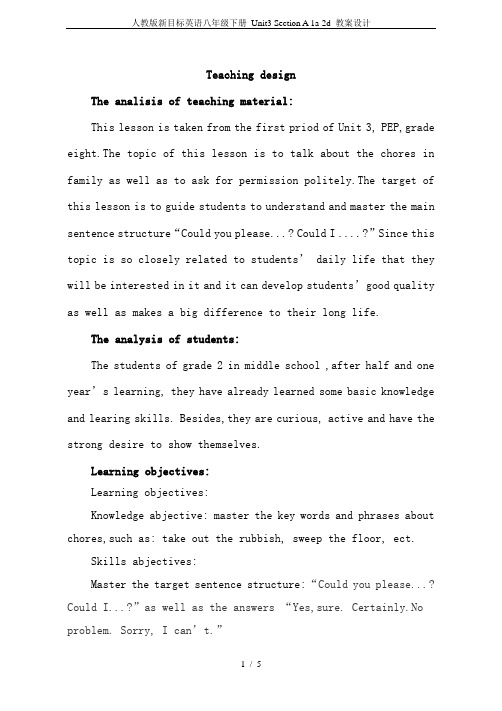
Teaching designThe analisis of teaching material:This lesson is taken from the first priod of Unit 3, PEP,grade eight.The topic of this lesson is to talk about the chores in family as well as to ask for permission politely.The target of this lesson is to guide students to understand and master the main sentence structure“Could you please...? Could I ....?”Since this topic is so closely related to students’ daily life that they will be interested in it and it can develop students’good quality as well as makes a big difference to their long life.The analysis of students:The students of grade 2 in middle school ,after half and one year’s learning, they have already learned some basic knowledge and learing skills. Besides,they are curious, active and have the strong desire to show themselves.Learning objectives:Learning objectives:Knowledge abjective: master the key words and phrases about chores,such as: take out the rubbish, sweep the floor, ect.Skills abjectives:Master the target sentence structure:“Could you please...? Could I...?”as well as the answers “Yes,sure. Certainly.No problem. Sorry, I can’t.”Emotional abjectives:Develop students’sense of responsibility and the sense of politeness.Key points of this lesson:1.Master the key worsd and phrases about chores.2.Learn to ask for resquests and permissions politely3.Improve the listening skillsDifficult points of this lesson:1.Master the target sentence structure“Could you pleasw...? Could I ...?”2.Learn to how to answer others’requests and permissions politely.Teaching methods:I mainly use the task-based language teaching and communicative language teaching methods in this lesson.And I will try my best to make students to be the host in class.Teaching procedures:Step 1 Warm-upI will ask students to read the title together“Could you please clean your room?”Then I will show students the objectives of this lesson,which includes the kowledge objective, skills objective and emotonal objective with the help of Objective Tree.Next, I will ask students the question“Could you please clean your room?”Step 2 PresentationI will use pictures to present students the target words and phrases,such as take out the rubbish, sweep the floor ,etc. Meanwhile, I will help students to understand the details like paying attention to the characteristics of “rubbish”as well as “take out”.Besides, I will lead students to read the phrases together, which aims to make students to master the corret pronunciation of each phrases.Step 3 Practice(A guessing game)I will ask students to look at the blackboard to guess what kind of chores that the people are doing in the pictures. The people are the students in our class.This activity motivates students greatly and it can make students review what they have learned just now greatly.They seem to be more interested in it.Step 4 PresentationI will ask students the question that “Who does the most housework in your family? If your mother are tired, who will she ask to help her? How can she say politely?”I will show students three kinds of sentence structures to them which one is the most polite. Then I will ask students to make conversations using thesentence structure and the pictures on the screen.Could you please....?Yes, sure. No problem. Of course. My pleasure.....Sorry, I can’t.Step 5 ListeningStudents should listen to the tape and finish the exercise in 1b.And they should report their answers using the complete sentences“Peter’s mother will.... Peter will...”Step 6 Group workTo be a monitorStudents should work in groups and choose a leader as the monitor.The monitor should arrange the activities on the duty day.They should make conversations using the sentence structure they have just learned. Next, I will pick up several groups to share their works.And I will give them some points to congratulate their good job.Step 7 ListeningStudents should liaten to the tape and finish the exercise in 2a. Then I will play it one more time and ask students to finish the exercise in 2b.Step 8 PresentationI will play the tape once again and ask students to look atthe listening material. And then I’d like them to find out the sentences to ask for permissions. Finally, I will lead students to summarise the structure about asking for permissions.Could I ....?Yes, you can. No,you can’t.Step 9 Group workStudents should work in groups to suppose they are Peter and Peter’ father and make conversations about the information in 2a and 2b.Three groups will be invited to share their works and I will give them some points to congratulate them.Step 10 Role-play the conversationFirst, I will play the tape and ask students to read after it one sentence by one sentence.Then I will ask students to role play it,that is, girls are sister and boys are brother.Finally, I will help them to understand some key points, such as help out with a few things, any minute now.......Step 11 exercisesStep 12 SummaryI will use the objective tree to help students to review what they have learned in this class.Step 13 Homework。
人教版八年级英语下册Unit3单元教学设计

1.通过情景教学法,创设真实语境,让学生在实际语境中学习并运用一般过去时;
2.运用任务型教学法,设计各种听说读写活动,提高学生的语言综合运用能力;
3.采用小组合作学习,鼓励学生互相交流,分享自己的经历,培养合作精神;
4.利用多媒体教学资源,如图片、视频等,丰富课堂教学内容,提高学生的学习兴趣;
d.课后布置相关作业,让学生运用所学知识进行写作,提高语言运用能力。
2.针对教学难点,采取以下措施:
a.提供典型例句,分析一般过去时的句子结构,帮助学生掌握语法规则;
b.创设丰富的语境,让学生在情境中进行角色扮演,提高口语表达能力;
c.设计分层教学,针对不同水平的学生提供不同难度的练习,使每个学生都能在原有基础上得到提高;
5.通过学习英语,拓宽视野,增强对世界的认知,树立正确的人生观和价值观。
二、学情分析
八年级下册的学生已经具备了一定的英语基础,对一般现在时和一般将来时有了较好的掌握。在此基础上,本单元的一般过去时对于学生来说是一个新的挑战。学生在学习过程中可能存在以下情况:
1.对一般过去时的理解和运用尚不熟练,需要通过具体实例和反复练习来巩固;
2.学会使用一般过去时描述过去发生的事情,如:I visited my grandparents last week;
3.能够听懂并参与课堂讨论,分享自己的过去经历;
4.提高阅读理解能力,理解并掌握课文中的重点句型和语法结构;
5.提高写作能力,能够运用一般过去时写作文,描述过去发生的事情。
(二)过程与方法
4.教师带领学生进行句型替换练习,巩固一般过去时的用法。
(三)学生小组讨论
1.教师将学生分成小组,要求他们用一般过去时描述过去发生的事情,如:“What did you do last weekend?”
英语:Unit 3教案(人教新目标八年级下)
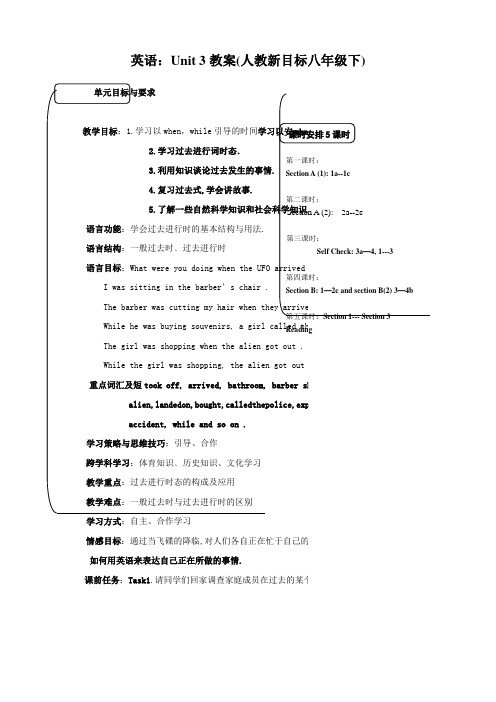
英语:Unit 3教案(人教新目标八年级下)学习方式:自主、合作学习情感目标:通过当飞碟的降临,对人们各自正在忙于自己的事如何用英语来表达自己正在所做的事情.课前任务:Task1.请同学们回家调查家庭成员在过去的某个时第一课时教学内容与分析教学内容:Section A (1): 1a---1c教学目标:1.能够掌握基本单词和词汇。
2.学会过去进行时的基本结构与用法。
3.能够运用以when 引导的时间状语从句。
4.能够运用基本句型进行提问。
学习任务:我的爱好目的:通过学生小组活动,调查在过去的不同时间里做不同的事情,学会使用过去进行时态,培养学生应用英语进行交际的能力。
语言技能:Listening .Speaking .Reading ﹑Writing语言知识:过去进行时的用法及复习一般过去时态提示词语及句型:got out, cut, barber shop, bathroom, kitchen, well, bathroomWhat were you doing when the UFO arrived ?I was sitting in the barber’s chair .The barber was cuttingmyhair when they arrived .教学重点、难点分析:教学重点:基本单词,词汇和句型教学难点:能够运用过去进行时谈论人们所做的事情.课前准备1.本课时的教学课件2.课前发给学生表格向学生布置任务:在表格中写出有关内容。
教学设计教学步骤建议和说明Teaching Steps :Step 1 :Warm-up and revision1.Share an English song .2.Greetings and free-talk .从平常的谈话中轻松导入本课句型,信息沟通使谈话非常真实,而又浅显What are you doing ? What did you do last night ?3.Show slides: Revise: is/an/are +动词ing4.Brain storm:Collect the names of activities which said by the students.Step 2 :Presentation :1.Watch a video2.By asking: What’s this in English ?Have you even seen it ?3.Teach:UFO, bedroom, bathroom, bedroom, kitchen,living-room, barber shopStep 3 :Work on:SB Page 18 , 1a .1.Point to the sentences .Read the sentences .Explain what each one means.2.Teach :barber shop, well, bathroom, bedroom, kitchen, get out, cut3.Look at the picture.. Point out the six people. Match the statements with the people in the picture4.Check the answers .5.Practice reading .Step 4 :Work on:SB Page 18 , 1b .1. Read the instructions .Make sure the Ss understand whatthey should do .2. Look at the dialogue in the picture .Explain :过去进行时态的构成: was / were + doing .用法:表示过去某一时刻或某一段时间正在进行的动作,一般用时间状语来表示。
人教版新目标英语八年级下册 Unit3 第3课时 教案设计
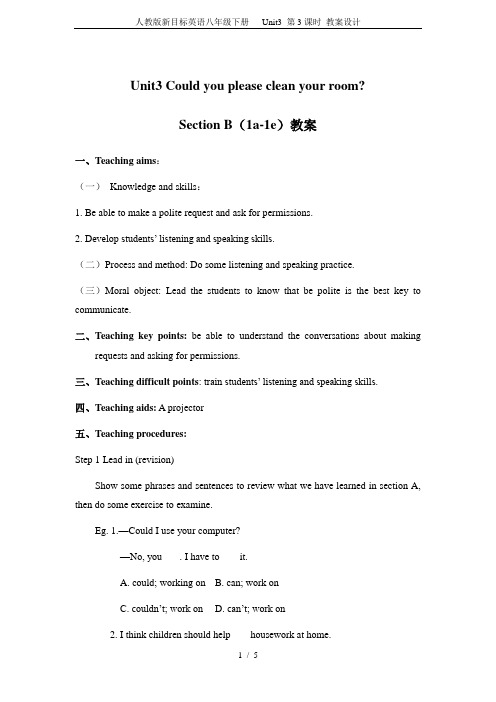
Unit3 Could you please clean your room?Section B(1a-1e)教案一、Teaching aims:(一)Knowledge and skills:1. Be able to make a polite request and ask for permissions.2. Develop students’ listening and speaking skills.(二)Process and method: Do some listening and speaking practice.(三)Moral object: Lead the students to know that be polite is the best key to communicate.二、Teaching key points:be able to understand the conversations about makingrequests and asking for permissions.三、Teaching difficult points: train students’ listening and speaking skills.四、Teaching aids: A projector五、Teaching procedures:Step 1 Lead in (revision)Show some phrases and sentences to review what we have learned in section A, then do some exercise to examine.Eg. 1.—Could I use your computer?—No, you ___. I have to ___ it.A. could; working onB. can; work onC. couldn’t; work onD. can’t; work on2. I think children should help ___ housework at home.A. toB. withC. forD. of3. Could you please _________ (make)your bed.4. Mary______ (make) her bed every day.5. Look! my mother ____________ (fold) the clothes6. He _______ (sweep)the floor and _______ (take) out the rubbish yesterday . Step 2 Presentation1. learn new words: listen to the tape.2.lead inLo ok at the pictures and ask students “What do your parents ask you to do?” and What do you ask your parents’ permission for?上图是图片导入3.activities 1aLet students know what they should do in this part. Say, look at items on the list. Some of these things only parents usually ask and some of them only teenagers usually ask. Ask students to complete the writing on their own books. Remind the students to write “parents” after each item parents ask teenagers to do, and write “teenagers” after each item teen agers ask their parents to do.Check the answers and try to remember these phrases.1.buy some drinks and snacks2. borrow some money3. clean your room4. invite my friends to a party5. go to the store6. use your CD player7. take out the rubbish8. make your bed4. Teach activity 1bThis activity provides guided oral practice using the target language.Point out the sample conversation, ask students to read it. Then make their own conversations by using the phrases in 1a.Parent: Could you please…?Child: Yes, sure. / Sorry, I can’t. I have to ...clean your roomtake out the rubbishChild: Could I …?Parent: Yes, you can. / No, you can’t. You ...buy some drinks and snacksborrow some moneyinvite my friends to a partygo to the storeStep 3 listening Practice1.Teach activity 1cRead the instructions. Point to the items in 1a. Say, listen to the conversation between Sandy and her mom. Please check each item they talked about.Play the recording for twice. Then correct the answers.2.Teach activity 1dThis activity gives students practice in understanding and writing the target language. Say, this time you have to write what the three people are going to do.Play the recoding again. Let students finish this part. Then correctthe answers.Step 4 Consolidation: teach activity 1eThis activity provides guided oral practice using the target language. imagine, one student has the party and ask for help to do chores. And then try to write on the paper.Step 5 SummaryIn this period, we have mainly done some listening and speaking practice to consolidate the target language. Through the practice, we also developed our listening and speaking skills.Step 6 Homework1.Remember the words and phrases in 1a.2.To preview the e-mail message on P22, finish 2c,2d.。
Unit3单元整体教学设计2023-2024学年人教版八年级英语下册

5.写作练习:学生根据所给情景,编写一篇简短的新闻报道。
核心素养目标
本节课旨在提高学生的英语学科核心素养,具体包括以下方面:
1.语言能力:通过学习新闻报道相关词汇和语法,提升学生的英语听、说、读、写能力,使其能够熟练运用英语进行新闻报道的编写和表达。
2.文化意识:通过学习新闻报道,使学生了解西方新闻报道的特点和结构,增强对不同文化背景下新闻传播方式的理解。
Judges from the local university and industry professionals evaluated the projects based on creativity, complexity, and practicality. Awards were given to the top three winners in each category.
3.阅读理解:理解新闻报道的结构和内容。
4.口语表达:能够运用所学知识进行新闻报道的模拟。
5.写作练习:编写一篇简短的新闻报道。
难点:
1.词汇学习:新闻报道相关词汇的记忆和应用。
2.语法点:一般过去时的用法和新闻报道信息提取。
4.口语表达:在模拟新闻报道中正确运用词汇和语法。
-鼓励学生参与新闻相关的社团或活动,如校园新闻社、模拟联合国等,提升新闻实践能力。
课堂小结,当堂检测
八年级英语下册《Unit3》教学设计 人教新目标版
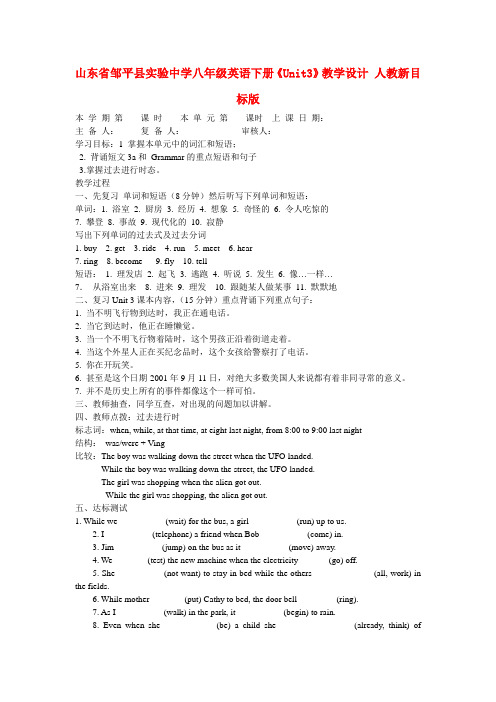
山东省邹平县实验中学八年级英语下册《Unit3》教学设计人教新目标版本学期第课时本单元第课时上课日期:________主备人:复备人:___________ 审核人:____________学习目标:1 掌握本单元中的词汇和短语;2. 背诵短文3a和Grammar的重点短语和句子3.掌握过去进行时态。
教学过程一、先复习单词和短语(8分钟)然后听写下列单词和短语:单词:1. 浴室2. 厨房 3. 经历4. 想象5. 奇怪的6. 令人吃惊的7. 攀登8. 事故9. 现代化的10. 寂静写出下列单词的过去式及过去分词1. buy2. get3. ride4. run5. meet6. hear7. ring 8. become 9. fly 10. tell短语:1. 理发店2. 起飞3. 逃跑 4. 听说 5. 发生6. 像…一样…7.从浴室出来8. 进来9. 理发10. 跟随某人做某事11. 默默地二、复习Unit 3课本内容,(15分钟)重点背诵下列重点句子:1. 当不明飞行物到达时,我正在通电话。
2. 当它到达时,他正在睡懒觉。
3. 当一个不明飞行物着陆时,这个男孩正沿着街道走着。
4. 当这个外星人正在买纪念品时,这个女孩给警察打了电话。
5. 你在开玩笑。
6. 甚至是这个日期-2001年9月11日,对绝大多数美国人来说都有着非同寻常的意义。
7. 并不是历史上所有的事件都像这个一样可怕。
三、教师抽查,同学互查,对出现的问题加以讲解。
四、教师点拨:过去进行时标志词:when, while, at that time, at eight last night, from 8:00 to 9:00 last night结构:was/were + Ving比较:The boy was walking down the street when the UFO landed.While the boy was walking down the street, the UFO landed.The girl was shopping when the alien got out.While the girl was shopping, the alien got out.五、达标测试1. While we __________ (wait) for the bus, a girl __________ (run) up to us.2. I __________ (telephone) a friend when Bob __________ (come) in.3. Jim __________ (jump) on the bus as it __________ (move) away.4. We _______ (test) the new machine when the electricity ______ (go) off.5. She __________ (not want) to stay in bed while the others _____________ (all, work) in the fields.6. While mother _______ (put) Cathy to bed, the door bell ________ (ring).7. As I __________ (walk) in the park, it __________ (begin) to rain.8. Even when she ___________ (be) a child she ________________ (already, think) ofbecoming a ballerina (芭蕾舞演员).9. It was quite late at night. George __________ (read) and Amy __________ (ply) her needle when they __________ (hear) a knock at the door.10. There __________ (be) a group round the fire when they ________ (reach) it. An old woman __________ (sit) on the ground near the kettle; two small children __________ (lie) near her; a donkey __________ (bend) his head over a tall girl.11. I _____ (have) my breakfast at half past six yesterday morning.12. Mary ____ (go) over her lessons from six to seven last night. John and peter ____(do) the same thing.13. What _____ you ___ (do) at that time? We _____ (watch) TV.14. Was your father at home yesterday evening? Yes ,he was. He____ (listen) to the radio.15. They _____(not make) a model ship when I saw him.16. _____ they ____ (have) a meeting at 4 yesterday afternoon?No, they _____. They _____ (clean) the classroom.17. ____ it _____(rain) when you left school? Yes, it ____. (No, it ____)18. What _____ your father _____ (do) when he was your age?19. One day, Edison _____ (wait) for a train to arrive, and suddenly a little boy ran to the track(轨道) to play.20. He asked me if I ______ (go) fishing that afternoon.21. The three of them were in a hurry because their plane _____ (leave) in five minutes.22. In a letter, john told us that he _____ (come) to china next month.23. When the bell rang, jenny _____ (wait) in her seat.24. She _____ (make) her dress the whole afternoon.25. While my father ___ (look) through the evening paper, he suddenly ____ a cry.26. When I ____ (come) in the room, he ____ (see) me, for he ____ (read) something27. When we _____ (arrive) at the village, it _____ (get) dark and it ____(rain) hard.28. I _____ (know) you ____(wait) for me here.29. One day a little monkey ____(play) in a tall tree. A mother crocodile(鳄鱼) ____ (look) for food near the bank.30. What ____ your father ____ (do) yesterday evening? He ____ (study) at the evening school.31. Later his parents found that he _____ (sit) on some eggs.32. When he knocked at the door, my aunt ____ (cook)33. The students ______ (sing) and ____ (dance) happily on the playground at that time.34. I ____ (write) a letter when the door bell rang.35. We had no classed at that time. We ____ (plant) trees.教学反思:。
新目标英语八年级下册Unit3教学设计
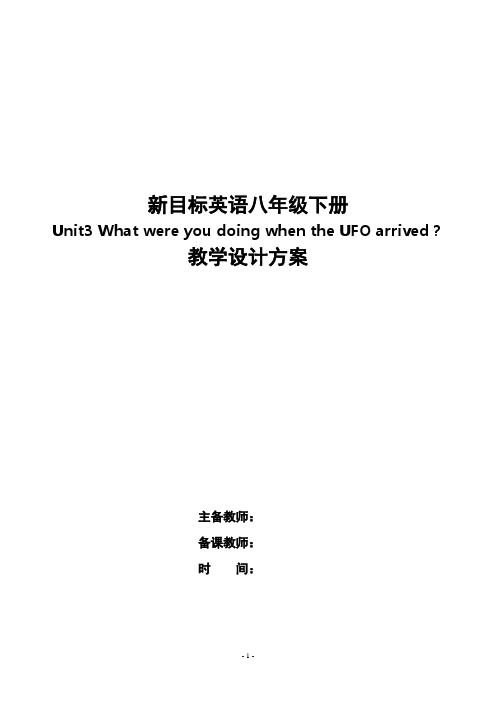
新目标英语八年级下册Unit3 What were you doing when the UFO arrived?教学设计方案主备教师:备课教师:时间:Unit3 What were you doing when the UFO arrived?教学设计方案一、单元教材分析:本单元的主要内容是"谈论过去发生的事情",语法重点是"过去进行时"。
Section A通过"谈论飞碟来时正在做的事",通过听力、对话练习、阅读等方式帮助学生掌握如何谈论过去发生的事(过去进行时和一般过去时);Section B通过听力、阅读、对话等方式,帮助学生掌握如何叙述过去发生的事情;Self Check部分通过填空和造句帮助学生复习所学词汇,通过根据材料写作练习讲述过去发生的事,通过分辨不同类的单词复习词汇;阅读部分帮助学生巩固一般过去时和过去进行时。
这一单元的重点在于"谈论过去发生的事情"。
二、预习目标:A知识与技能目标a. 能够认读单词,明确单词的意思:bathroom, bedroom, kitchen, UFO, alien, barber's chair cutting hair, climbing, jumping land, get out of, take off, in front of scaredb. 掌握以when引导的时间状语从句;重点句型:What were you doing when ...? I was doing sth. when ...用正确的方式描述课本中的图片。
B能力目标提高学生听、说、读、写综合运用知识的能力。
C情感态度与价值观发挥学生的潜能,回忆过去美好的时光,调动学生的积极性。
三、预习重点和难点:重点:以when为引导的时间状语从句难点:过去进行时与现在进行时的对比区别预习策略:以学生自学为主。
人教版新目标八年级英语下册第三单元第一课时教案设计
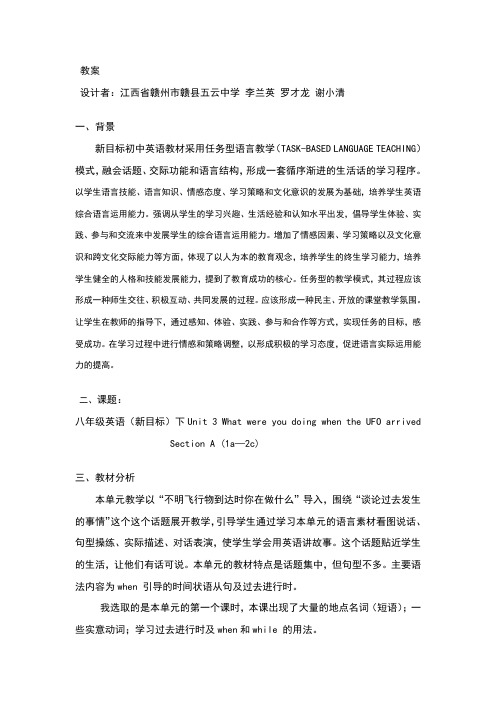
教案设计者:江西省赣州市赣县五云中学李兰英罗才龙谢小清一、背景新目标初中英语教材采用任务型语言教学(TASK-BASED LANGUAGE TEACHING)模式,融会话题、交际功能和语言结构,形成一套循序渐进的生活话的学习程序。
以学生语言技能、语言知识、情感态度、学习策略和文化意识的发展为基础,培养学生英语综合语言运用能力。
强调从学生的学习兴趣、生活经验和认知水平出发,倡导学生体验、实践、参与和交流来中发展学生的综合语言运用能力。
增加了情感因素、学习策略以及文化意识和跨文化交际能力等方面,体现了以人为本的教育观念,培养学生的终生学习能力,培养学生健全的人格和技能发展能力,提到了教育成功的核心。
任务型的教学模式,其过程应该形成一种师生交往、积极互动、共同发展的过程。
应该形成一种民主、开放的课堂教学氛围。
让学生在教师的指导下,通过感知、体验、实践、参与和合作等方式,实现任务的目标,感受成功。
在学习过程中进行情感和策略调整,以形成积极的学习态度,促进语言实际运用能力的提高。
二、课题:八年级英语(新目标)下Unit 3 What were you doing when the UFO arrived Section A (1a—2c)三、教材分析本单元教学以“不明飞行物到达时你在做什么”导入,围绕“谈论过去发生的事情”这个这个话题展开教学,引导学生通过学习本单元的语言素材看图说话、句型操练、实际描述、对话表演,使学生学会用英语讲故事。
这个话题贴近学生的生活,让他们有话可说。
本单元的教材特点是话题集中,但句型不多。
主要语法内容为when 引导的时间状语从句及过去进行时。
我选取的是本单元的第一个课时,本课出现了大量的地点名词(短语);一些实意动词;学习过去进行时及when和while 的用法。
四、教学方法用计算机辅助教学,以任务型教学法为主体,以小组活动,两人协作为依托。
以游戏、听力、口头练习和笔头练习为载体开展教学。
新目标八年级英语下册Unit 3教学设计
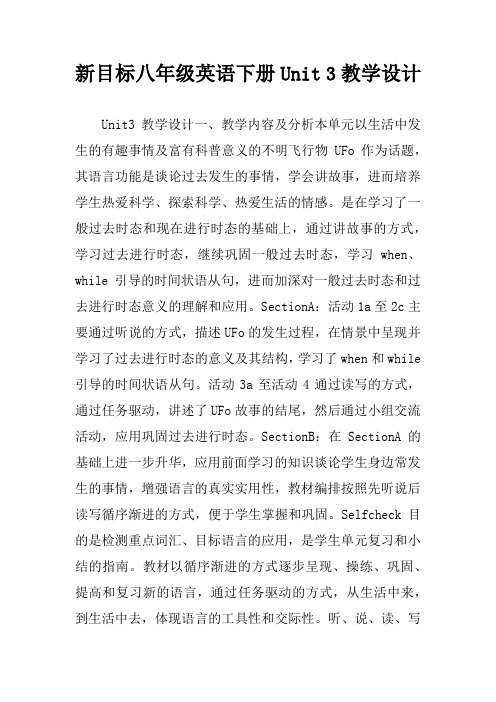
新目标八年级英语下册Unit 3教学设计Unit3教学设计一、教学内容及分析本单元以生活中发生的有趣事情及富有科普意义的不明飞行物UFo作为话题,其语言功能是谈论过去发生的事情,学会讲故事,进而培养学生热爱科学、探索科学、热爱生活的情感。
是在学习了一般过去时态和现在进行时态的基础上,通过讲故事的方式,学习过去进行时态,继续巩固一般过去时态,学习when、while引导的时间状语从句,进而加深对一般过去时态和过去进行时态意义的理解和应用。
SectionA:活动1a至2c主要通过听说的方式,描述UFo的发生过程,在情景中呈现并学习了过去进行时态的意义及其结构,学习了when和while 引导的时间状语从句。
活动3a至活动4通过读写的方式,通过任务驱动,讲述了UFo故事的结尾,然后通过小组交流活动,应用巩固过去进行时态。
SectionB:在SectionA的基础上进一步升华,应用前面学习的知识谈论学生身边常发生的事情,增强语言的真实实用性,教材编排按照先听说后读写循序渐进的方式,便于学生掌握和巩固。
Selfcheck目的是检测重点词汇、目标语言的应用,是学生单元复习和小结的指南。
教材以循序渐进的方式逐步呈现、操练、巩固、提高和复习新的语言,通过任务驱动的方式,从生活中来,到生活中去,体现语言的工具性和交际性。
听、说、读、写贯穿整个学习过程,让学生体验合作交流的学习方式,感受语言学习之乐。
二、学习者特征分析本单元的主要目标是学习掌握过去进行时态,巩固应用一般过去时态,学会讲故事或描述身边发生的事情,它是在学生已经学习了现在进行时态和一般过去时态的基础上继续学习的。
对于八年级的学生,学生已经有了一定的词汇量,特别是要用好多的动词,学生有了一定的基础,这样便于教学内容的突破;更好的是教材选编了一些富有科普意义的UFo,更能激发学生的好奇心和学习兴趣,所以本单元的学习,学生应该能轻松的掌握。
三、单元整体目标分析1、知识与能力:(1)、Vocabulary(词汇)A、Newwordsandphrasesbarbershop,bathroom,bedroom,kitchen,UFo,alien,experience,accident,cuttinghair,climbing,jumping,shouting,land,getoutof,takeoff,follow,happen,scared,strange,amazingB、Recyclingshop,store,library,supermarket,museum,TVstation,police,boy,girl,reporter,called,tookaphoto,eatinglunch,crowded(2)、Grammar(语法)A、Structures (语言结构)Adverbialclausewithwhen,while QuestionsandstatementswithpastprogressiveReviewPasttenseB、Targetlanguage(目标语言)whatwereyoudoingwhentheUFoarrived?Iwassittingintheb arber’schair.Thebarberwascuttingmyhair.whilehewasbuyingas ouvenir,agirlcalledthepolice.(3)、Functions(功能)Talkaboutpastevents.Tellastory.2、过程与方法本单元通过听说读写各种活动,了解了UFo,学习了UFo 的故事发生过程,巩固掌握一般过去时态和过去进行时态,能够讲述或者复述故事,描述自己身边发生的事情。
人教版八年级英语下册Unit3教学设计

3.学生在课堂上表现积极,乐于参与各种活动,但部分学生过于依赖教师引导,缺乏自主学习能力,需要在教学中逐步培养。
4.学生在情感态度上,对英语学习兴趣较浓,但在面对困难时,容易产生挫败感,需要教师关注学生的心理变化,适时给予鼓励和支持。
3.句型:学生能够掌握以下句型的用法:What did you do last weekend? I went to the beach. How was your day? It was boring. What did you have for lunch? I had a delicious sandwich等。
3.学会与他人分享快乐,提高团队协作能力。
4.增强自信心,勇于尝试新事物,不断挑战自我。
5.感受英语学习的乐趣,树立学习英语的信心,提高自主学习能力。
二、学情分析
针对人教版八年级英语下册Unit3的教学内容,对学生学情进行分析如下:
1.学生已具备一定的英语基础知识,能够运用简单的英语进行日常交流,但在表达过去事情时,对动词过去式的运用尚不熟练,需要进一步巩固和指导。
四、教学内容与过程
(一)导入新课
1.教师通过展示一组图片,如:孩子们在沙滩玩耍、参观博物馆、野餐等,引导学生观察并询问:“What are they doing?”、“Can you guess what they did last weekend?”,从而引出一般过去时态的概念。
2.邀请学生分享他们上周的有趣经历,让学生尝试用英语描述,为新课的学习营造轻松愉快的氛围。
5.自主学习:
a.利用网络资源,查找一般过去时的相关资料,加深对语法知识点的理解。
Unit3SectionA1a-2c(教学设计)2023-2024学年人教版八年级英语下册

1.软硬件资源:多媒体教室、投影仪、计算机、音响设备、白板、教学挂图、节日相关物品(如感恩节火鸡、圣诞节装饰品等)。
2.课程平台:人教版八年级英语下册教材、教学课件、听力材料、在线词典、相关节日文化背景资料。
3.信息化资源:互联网、在线教育平台、社交媒体(如微博、微信等)、学习管理系统(如Moodle、Blackboard等)。
3.答案:C
解析:选项C的句子表达方式是正确的。选项A的句子中,“celebrating Thanksgiving with my family”应改为“having a Thanksgiving dinner with my family”;选项B的句子中,“a small turkey”应改为“a small turkey dinner”;选项D的句子中,“Christmas is the most important festival in China”应改为“Christmas is one of the most important festivals in China”。
提出问题,检查学生对旧知的掌握情况,为本节课新课学习打下基础。
(三)新课呈现(预计用时:25分钟)
知识讲解:
清晰、准确地讲解1a-2c节的知识点,结合实例帮助学生理解。
突出节日文化重点,强调文化差异难点,通过对比、归纳等方法帮助学生加深记忆。
互动探究:
设计小组讨论环节,让学生围绕节日文化习俗展开讨论,培养学生的合作精神和沟通能力。
(3)The Spring Festival is the most important traditional Chinese festival, also known as the Chinese New Year.
人教版新目标八下Unit3精品教案
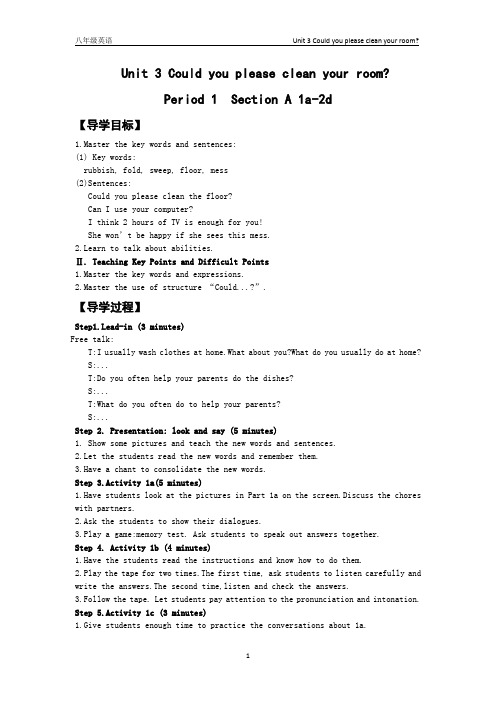
Unit 3 Could you please clean your room?Period 1 Section A 1a-2d【导学目标】1.Master the key words and sentences:(1) Key words:rubbish, fold, sweep, floor, mess(2)Sentences:Could you please clean the floor?Can I use your computer?I think 2 hours of TV is enough for you!She won’t be happy if she sees this mess.2.Learn to talk about abilities.Ⅱ. Teaching Key Points and Difficult Points1.Master the key words and expressions.2.Master the use of structure “Could...?”.【导学过程】Step1.Lead-in (3 minutes)Free talk:T:I usually wash clothes at home.What about you?What do you usually do at home? S:...T:Do you often help your parents do the dishes?S:...T:What do you often do to help your parents?S:...Step 2.Presentation: look and say (5 minutes)1. Show some pictures and teach the new words and sentences.2.Let the students read the new words and remember them.3.Have a chant to consolidate the new words.Step 3.Activity 1a(5 minutes)1.Have students look at the pictures in Part 1a on the screen.Discuss the chores with partners.2.Ask the students to show their dialogues.3.Play a game:memory test. Ask students to speak out answers together.Step 4. Activity 1b (4 minutes)1.Have the students read the instructions and know how to do them.2.Play the tape for two times.The first time, ask students to listen carefully and write the answers.The second time,listen and check the answers.3.Follow the tape. Let students pay attention to the pronunciation and intonation. Step 5.Activity 1c (3 minutes)1.Give students enough time to practice the conversations about 1a.2.Ask them to make their own conversations. For example:A: Could you please sweep the floor ?B: Yes,sure. Can you do the dishes?C: Well, could you please do them? I’m going to clean the living room.D: No problem.Step 6.Activity 2a and 2b (5 minutes)1.Get the students have a quick look at the instructions of these two activities, so they can know how to do them.2.Play the recording the first time for the first time to get the main idea.3.Play it again for then to complete the sentences in 2b.4.Check the answers.5.Follow the tape.Step 7.Activity 2c (3 minutes)1.Work in pairs to talk about chores.2.Invite several pairs to act out their conversations.Step 8. Activity 2d (7 minutes)3.1.Role play the conversation and think about what others would like to say to you and try to make the conversations. Please begin with: Could you please …?2.Read after the tape,pay attention to the pronunciation and intonation.4.Ask students to make a report like this:Hello! I’m … In my group, … does the dishes and cleaning._______________________________________________________________________________ _______________________________________________________________________________ _____ .We think ... is the most able one at home.5.Explain some language points.Step 9. Summary (2 minutes)Let the students think about what we have learned in the period.Step 10. Exercises (8 minutes)Let the students finish the exercises to consolidate what we have learned today. 【探究归纳】1.Could you please take out the rubbish?take out 拿出来, 取出来He took a dictionary out. 他拿出来一本字典。
人教新目标八年级英语下册教案:unit 3 教案

Unit 3 Could you please clean your room?Section A 2a-2dTeaching Plan for “Could you please clean your room?”Section A 2a-2dI.Teaching Material AnalysisIn this period, students should know how to ask for permission. And after doing some listening practice, students should be given opportunity to practice a longer conversation using the target language.II.Students AnalysisStudents have learnt some Modal verbs such as can, may, should. And it’s good for them do know the use of “could”. However, they always do nothing at home but their parents do everything for them. So it’s important to teach them to make polite requests and ask for permission politely.III.Demands from English Curriculum StandardsAccording to English Curriculum Standards, English teaching should help students to develop for their whole life. Students are the hope of the future and they are under the task to make the world improved. So knowing how to make polite requests and ask for permission politely is important for the students. And know how to do something good for our society is also important for them.IV.Teaching objectives1.Knowledge objective:Students will be able to tell the meanings of important phrases including help out with sth., at least, take out the rubbish, fold the clothes, do the dishes, etc.2. Ability objectives: Students will be able to①know how to solve some problems with their partners.② make new conversations with the target language.3. Moral objectives: Students will able to①love and do something good for our society.② develop a sense of groupwork.V.Special teaching and learning methodsTask-based method; self-dependent and cooperative learningVI. Teaching proceduresThanks! Have a good day☺。
人教新目标八年级英语下册教案:Unit3
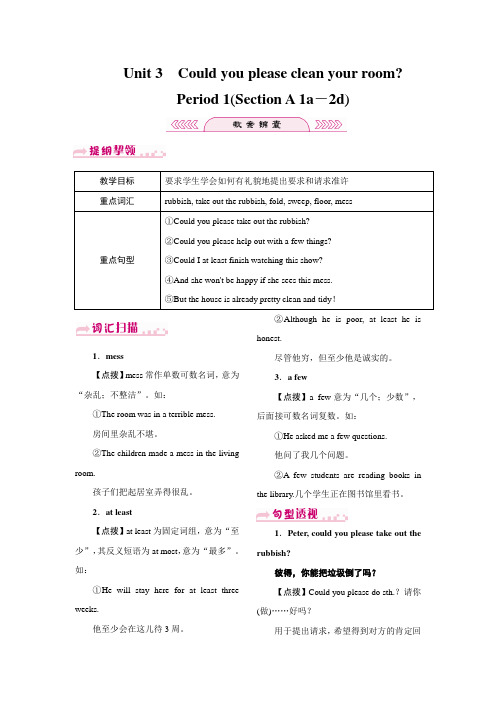
Unit 3Could you please clean your room?Period 1(Section A 1a-2d)1.mess【点拨】mess常作单数可数名词,意为“杂乱;不整洁”。
如:①The room was in a terrible mess.房间里杂乱不堪。
②The children made a mess in the living room.孩子们把起居室弄得很乱。
2.at least【点拨】at least为固定词组,意为“至少”,其反义短语为at most,意为“最多”。
如:①He will stay here for at least three weeks.他至少会在这儿待3周。
②Although he is poor, at least he is honest.尽管他穷,但至少他是诚实的。
3.a few【点拨】a few意为“几个;少数”,后面接可数名词复数。
如:①He asked me a few questions.他问了我几个问题。
②A few students are reading books in the library.几个学生正在图书馆里看书。
1.Peter, could you please take out the rubbish?彼得,你能把垃圾倒了吗?【点拨】Could you please do sth.?请你(做)……好吗?用于提出请求,希望得到对方的肯定回教学目标要求学生学会如何有礼貌地提出要求和请求准许重点词汇rubbish, take out the rubbish, fold, sweep, floor, mess重点句型①Could you please take out the rubbish?②Could you please help out with a few things?③Could I at least finish watching this show?④And she won't be happy if she sees this mess.⑤But the house is already pretty clean and tidy!答,说话的语气比较客气委婉。
新人教版八年级英语下册unit3教案.doc

新人教版八年级英语下册Unit3 Could you please clean your room ?Section A (1a—2c)教案Teaching Aims :1.Knowledge Objects :(1).Master the key words and phrases:rubbish, take out the rubbish, fold, sweep, floor, mess.(2).Target language :—Could you please ...?—Yes, sure. /All right. /No problem./Certainly/Of course.Sorry, I can't. I have to do...Sorry, I can't. I am doing...—Could I ...?—Yes, you can. /Sorry, you can’t.2.Ability Objects :(1).Learn to make a polite request and ask for permissions.(2).Be able to understand the dialouges about making a polite request and asking for permissions.3.Moral Objects :(1).Lead the students to know that it’s always right to be polite.(2).Chores are part of fun in our life.Teaching Key Points :1.Master the new words and expressions.2.How to make a polite request and ask for permissions.Teaching Difficult Points :Be able to make polite requests and ask for permissions.Teaching Aids :A tape recorder, A projector.Teaching Procedures :Step 1 Lead-inGreet the class ang listen a song“我爱我家”.(Show some pictures about home in the projector.)Ask some questions:Eg: Do you like your family ? Do you like your father ? Do you like your mother ? Who is the busiest at your home? Why is your house clean?Step 2 Presentation1.Introduction and new words learning.T: Your mothers are always busy, beacuse there are many chores at home. (Learn chore.) For example : do the dishes, take out the rubbish, fold the clothes, sweep the floor, make the bed, clean the living room.Next teach the new words and phrases by using the pictures in the projector.Then ask students “ what other chores do you know?”2.Guessing game. What is she doing ?3.Pair work. Do you do these things at home? Write “Y”for “yes”and “N”for “no”.4.The key sentence introduction.T: If you want Peter to do the dishes, what should you say ? “Peter, do the dishes.”“Can you do the dishes ?”“Could you please do the dishes ?” Which sentence is the most polite ?Ss :Could you please do the dishes ?T: Here, could is not the past tense. Using could is more polite.—Could you please ...?Yes, sure. /All right. /No problem./Certainly/Of course.Sorry, I can't. I have to do...Sorry, I can't. I am doing...Step 3 Teaching activitiesActivity 1 Group work.Welcome to my room ! But this is a dirty room. How to make the room clean? Division of labor within the group.The fastest group is the winner. The key sentence:—Could you please ...?Yes, sure. /All right. /No problem./Certainly/Of course.Sorry, I can't. I have to do...Sorry, I can't. I am doing...Activity 2 Listening.1.Review the chores. Then listen to the tape, who will do these chores?Check (√)Peter’s mother or Peter.2.Listen again, finish the blanks.3.Role play the tapescript. The boys PK the girls.Activity 3 Interview .Who is the most able at home?1. What chores do you do at home? How often do you do the chores? Work in group.2. Then one student make a report to the class. “In my group,…. does the dishes every day,…We think …is the most able one in our group.”3.The awards.Give the awards to the most able student in each group.Step 4 Summary1. New vocabularydo the dishes, sweep the floor, take out the trash, make the bed, fold the clothes, clean the room2. —Could you please ...?—Yes, sure. /All right. /No problem./Certainly/Of course.Sorry, I can't. I have to do...Sorry, I can't. I am doing....Step5 Homework1.Conversation practice:Make a conversation between you and your parent about doing the chores. Remember to use the sentences we learnt today.2.Review and remember the new words.【Blackboard Design】Unit 3 Could you please clean your room?Section A 1a—1cLove our parents! Help do the chores!。
新目标人教版八年级英语下册Unit3公开课用教案

Unit3 Could you please clean your room ?Section AXu Yihua Class One,Grade 8 2015-3-26 Teaching Aims :1.Knowledge Objects :(1).Master the key words and phrases:rubbish, take out the rubbish, fold, sweep, floor(2).Target language :—Could you please ...?—Yes, sure. /All right. /No problem./Certainly/Of course.Sorry, I can't. I have to do...Sorry, I can't. I am doing...2.Ability Objects :(1).Learn to make a polite request and ask for permissions.(2).Be able to understand the dialouges about making a polite request and asking for permissions.3.Moral Objects :(1).Lead the students to know that it’s always right to be polite.(2).Chores are part of fun in our life.Teaching Key Points :1.Master the new words and expressions.2.How to make a polite request and ask for permissions.Teaching Difficult Points :Be able to make polite requests and ask for permissions. Teaching Procedures :Step 1. Lead-inGreet the class Show some pictures about home in the projector.)Ask some questions:Eg: Do you like your family ? Do you like your father ? Do you like your mother ? Who is the busiest at your home? Why is your house clean?Step 2. Presentation1.Introduction and new words learning.T: Your mothers are always busy, beacuse there are many chores at home. (Learn chore.) For example : do the dishes, take out the rubbish, fold the clothes, sweep the floor, make the bed, clean the living room.Next teach the new words and phrases by using the pictures in the projector.Then ask students “ what other chores do you know?”2.Guessing game. What is she doing ?3.Pair work. Do you do these things at home? Write “Y”for “yes”and “N”for “no”.4.The key sentence introduction.T: If you want Peter to do the dishes, what should you say ? “Peter, do the dishes.”“Can you do the dishes ?”“Could you please do the dishes ?” Which sentence is the most polite ?Ss :Could you please do the dishes ?T: Here, could is not the past tense. Using could is more polite.—Could you please ...?Yes, sure. /All right. /No problem./Certainly/Of course.Sorry, I can't. I have to do...Sorry, I can't. I am doing...Step 3. PracticeActivity 1 Group work.Welcome to my room ! But this is a dirty room. How to make the room clean? Division of labor within the group.The fastest group is the winner. The key sentence:—Could you please ...?Yes, sure. /All right. /No problem./Certainly/Of course.Sorry, I can't. I have to do...Sorry, I can't. I am doing...Activity 2 Listening.1.Review the chores. Then listen to the tape, who will do these chores?Check (√)Peter’s mother or Peter.2.Listen again, finish the blanks.3.Role play the tapescript. The boys PK the girls.Step 4. Summary1. New vocabularydo the dishes, sweep the floor, take out the trash, make the bed, fold the clothes, clean the room2. —Could you please ...?—Yes, sure. /All right. /No problem./Certainly/Of course.Sorry, I can't. I have to do...Sorry, I can't. I am doing...Step 5. Homework1.Conversation practice:Make a conversation between you and your parent about doing the chores. Remember to use the sentences we learnt today.2.Review and remember the new words.。
- 1、下载文档前请自行甄别文档内容的完整性,平台不提供额外的编辑、内容补充、找答案等附加服务。
- 2、"仅部分预览"的文档,不可在线预览部分如存在完整性等问题,可反馈申请退款(可完整预览的文档不适用该条件!)。
- 3、如文档侵犯您的权益,请联系客服反馈,我们会尽快为您处理(人工客服工作时间:9:00-18:30)。
八年级下册 Unit3 教学案、课堂要求:1.练习掌握本单元的基础知识:一般过去时的用法;以when和while引导的状语从句。
2.能够通过练习熟练掌握如何谈论过去发生的事。
Section A固定短语1.be busy with sth / be busy doing sth 忙于某事2.get out of ···从···出来3.walk down the street 沿着街走4.at around ten o‘clock 在大约10点钟5.an unusual experience 一个不寻常的经历6.take a shower 洗澡7.on one’s way to 在某人去~~的路上8.as a country tercher 作为一名乡村教师9.hurt one’s feeling 伤害某人的感情10.take off 飞机起飞;脱下衣服11.go after = follow 跟随12.begin to do sth 开始去做某事重点句型1.The boy was walking down the street when the UFO landed.当UFO着路的时候,这个男孩正沿着街走。
2.While the boy was walking down the street ,the UFO landed.当UFO着路的时候,这个男孩正沿着街走。
When / while 都有“当~~时”之意,引导时间状语从句。
短暂性谓语动词的句子用一般过去时态,延续性动词用过去进行时态。
自主先学:1.预习课本18,19页,找出下列词组单词1 不明飞行物____________2、理发师______________3、理发店__________________4、浴室________________5、卧室,寝室_________________6、厨房__________________7、出去,离开____________8、外星人________________9、动词buy的过去时__________ 10、着陆____________11、动词get的过去式_____________12、起飞___________________ 13、当的时候___________________短语1在浴室里_________________________2、在厨房里___________________________3、在我的卧室里_________________________4、在我的理发店_______________________5、在图书馆前面________________________6、在理发店的椅子上____________________7、在图书馆里学习_______________________8、打扫我的房间_____________________9、睡过头____________________________10、做奶昔_____________________________ 11、做饭_________________________12、从浴室里出来____________________________ 13、打电话_________________________14、吃午饭_________________________________ 15、理发_________________________16、起飞___________17电视台___________ 18.出去,离开________________2.完成课本1a 要求,图文搭配。
3模仿课本1c 练习。
Look!What were these people doing when the UFO arrived?Jim was writing a diary in his bedroom when the UFO arrived.Belinda was ____________________. Bob ____________________.Geoffrey ____________________.The twins were ____________________.My parents ____________________.交流探讨1 过去进行时三 知识点导学知识点一. UFO :Unidentified Flying Object 不明飞行物1947年6月24日,一名叫做阿诺德的美国商人,架着一架小型飞机在华盛顿州上空,发现一组巨型不明飞行物以1000公里左右的速度,同他一起在空中翱翔。
阿诺德的有关目击报告第一次引起公众的兴趣,从此“飞碟”或UFO 便迅速流传开来。
知识点二、in front of 与 in the front ofin front of 指在某一事物外部的前面,其反义词为behind ,意为“在。
的后面”。
in the front of 意为“在。
的前部”,指在某一事物的内部的前面,其反义词为at the back of 。
,意为“在。
(范围内)的后部。
”活学活用1 这位老人正坐在他的房子前。
____________________________________________.2 我喜欢坐在教室的前面。
_______________________________________________. 知识点三词条词性词义例句land 名词陆地Most animals live on land.动词着陆The plane landed safely.活学活用根据汉语或首字母提示完成句子。
1 They were the first men to l________on the moon.2 It was good to be back on ____________(陆地)知识点四when与while引导的状语从句When和while这两个词都可以作连词,引导时间状语从句,表示“当。
的时候”。
1 when 引导的时间状语从句,既可以表示“一段时间”,又可以表示“一点时间”,因此从句的谓语动词既可以使延续性的,也可以是非延续性的。
常跟一般过去时如:When I cane back from school, I had a short rest. When I was writing ,she came in .2 while引导的时间状语从句只能表示“一段时间”,所以while从句的谓语动词须是延续性动词。
常跟过去进行时如:While we were having dinner ,the telephone rang .While I was in Shanghai ,I saw her three times.1.When the alien got out, the girl was shopping=While the girl was shopping, the alien got out.2.When the UFO landed, the boy was walking down the street.==While the boy was walking down the street, the UFO landed活学活用单项填空1 Don’t be afraid of asking for information _________it is neede d.A whenB afterC althoughD unless2 A good friend always gives you a hand ______you’re in trouble .A whenB beforeC untilD though3 He met many problems _________he was going over his lessons.A beforeB as soon asC sinceD while对话练习:看课本2c图片,用when和while练习。
例如:A:What was the girl doing when the UFO took off?B: While the girl was…C: When the UFO took off the man was…句子1当不明飞行物到达的时候,你正在做什么?___________________________________________________________________________________________________________________________________2当不明飞行物着陆时,这个小男孩正沿着街道走。
._________________________________________________________________3当他看见这个外星人出来时,这个小男孩正在购物。
_________________________________________________________________4 当这个外星人买纪念品时,这个小女孩报了警。
_________________________________________________________________5 当这个外星人参观博物馆时,这个小男孩给电台打了电话_________________________________________________________________一、自主先学:1.预习课本20页,找出下列单词1经历,体验______________2想象,设想___________3 奇怪的,陌生的___________4 跟随,追随_________________5 令人惊异的_______________6 开玩笑,戏弄________ 短语1 一个非常不寻常的经历________________________2 在星期天________________3 在早晨_________________________4 正好着陆在我前面_________________________5 走进一个礼品店__________________6 给警察打电话___________________________7 离开商店______________________二、知识点导学知识点一I had a very unusual experience on Sunday.星期天我经历了一件不寻常的事儿。
